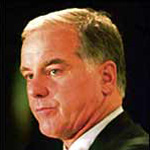By Lauren Ober
Published March 9th 2006 in Burlington Free Press
It appears Burlington's new instant runoff voting system was a success.
The experiment in voting was new this year after a 2005 change in the city charter. The Burlington mayoral race was the first political contest to make use of the new system.
State officials and independent observers hailed the new system, citing its cost-saving benefits and its user-friendly approach to voting. Secretary of State Deb Markowitz, whose office was keeping close tabs on the instant runoff system for possible use in statewide elections, praised the new process.
"It looks like it went very well. Voters knew what they were going in for," Markowitz said. "It was a great experiment."
Markowitz said her office hadn't fielded any complaints about the new system and from the information reported back to her, everything seemed to work well. Markowitz suggested that the Burlington race could be used as a jumping-off point for a move to a statewide instant runoff system.
"It's a good place to start the conversation," Markowitz said.
City councilor Joan Shannon. D-Ward 5, who sat on the charter change committee in 2005 and helped make instant runoff voting a reality, said she was pleased with the runoff system in Tuesday's election. From the wards she observed, all seemed to be working seamlessly.
"I think generally the public received it well. People certainly got it. They didn't feel confused and they voted accordingly," Shannon said.
With the old voting system, because none of the candidates received 40 percent of the vote, a runoff would have been necessary, which Shannon says would have cost the city a lot of money.
Under the new system, voters ranked the candidates by preference. Because no candidate won a majority when the votes were first counted, the candidates with the lowest number of votes -- in this case, Republican Kevin Curley and independents Louie The Cowman Beaudin and Loyal Ploof -- were eliminated. The second choices of those who voted for the eliminated candidates then went to the remaining two contenders--Progressive Bob Kiss and Democrat Hinda Miller. It took only one round for Kiss to gain a majority of the votes.
Shannon contends the system eliminates the "spoiler candidate effect." In the 2000 presidential election, Green Party candidate Ralph Nader was accused of being a spoiler candidate when he ran against Al Gore and now-President George W. Bush.
Beneficiaries of the spoiler effect might not like the new system, but it's a fairer method, Shannon said.
Not everyone is as convinced of the instant runoff system's efficacy. Anthony Gierzynski, an associate professor of political science at the University of Vermont, offered concerns about the complexity of the ballot and how that might exclude some voters from the democratic process.
Gierzynski's students conducted exit polls of about 1,000 Burlington voters. The results won't be ready until next week, but Gierzynski says he did get the sense the new ballots were problematic to some voters. He'll examine the data his students collected to see if there were any differences in understanding the new system across education levels and the various city wards.
"Some people felt they had to rank all five candidates. There was some confusion and those were the people who didn't like it," he said.
The experiment in voting was new this year after a 2005 change in the city charter. The Burlington mayoral race was the first political contest to make use of the new system.
State officials and independent observers hailed the new system, citing its cost-saving benefits and its user-friendly approach to voting. Secretary of State Deb Markowitz, whose office was keeping close tabs on the instant runoff system for possible use in statewide elections, praised the new process.
"It looks like it went very well. Voters knew what they were going in for," Markowitz said. "It was a great experiment."
Markowitz said her office hadn't fielded any complaints about the new system and from the information reported back to her, everything seemed to work well. Markowitz suggested that the Burlington race could be used as a jumping-off point for a move to a statewide instant runoff system.
"It's a good place to start the conversation," Markowitz said.
City councilor Joan Shannon. D-Ward 5, who sat on the charter change committee in 2005 and helped make instant runoff voting a reality, said she was pleased with the runoff system in Tuesday's election. From the wards she observed, all seemed to be working seamlessly.
"I think generally the public received it well. People certainly got it. They didn't feel confused and they voted accordingly," Shannon said.
With the old voting system, because none of the candidates received 40 percent of the vote, a runoff would have been necessary, which Shannon says would have cost the city a lot of money.
Under the new system, voters ranked the candidates by preference. Because no candidate won a majority when the votes were first counted, the candidates with the lowest number of votes -- in this case, Republican Kevin Curley and independents Louie The Cowman Beaudin and Loyal Ploof -- were eliminated. The second choices of those who voted for the eliminated candidates then went to the remaining two contenders--Progressive Bob Kiss and Democrat Hinda Miller. It took only one round for Kiss to gain a majority of the votes.
Shannon contends the system eliminates the "spoiler candidate effect." In the 2000 presidential election, Green Party candidate Ralph Nader was accused of being a spoiler candidate when he ran against Al Gore and now-President George W. Bush.
Beneficiaries of the spoiler effect might not like the new system, but it's a fairer method, Shannon said.
Not everyone is as convinced of the instant runoff system's efficacy. Anthony Gierzynski, an associate professor of political science at the University of Vermont, offered concerns about the complexity of the ballot and how that might exclude some voters from the democratic process.
Gierzynski's students conducted exit polls of about 1,000 Burlington voters. The results won't be ready until next week, but Gierzynski says he did get the sense the new ballots were problematic to some voters. He'll examine the data his students collected to see if there were any differences in understanding the new system across education levels and the various city wards.
"Some people felt they had to rank all five candidates. There was some confusion and those were the people who didn't like it," he said.
 On March 16th, Former Vermont Governor and Democratic National Committee Chair Howard Dean continued his support for instant runoff voting on Vermont Radio's Mark Johnson Show. Commenting on Burlington's recent IRV election, Dean said "I think the best and most democratic way to use to elect people in multiparty elections is instant runoff voting." Dean also supported the system when it was first used in Burlington in 2006.
On March 16th, Former Vermont Governor and Democratic National Committee Chair Howard Dean continued his support for instant runoff voting on Vermont Radio's Mark Johnson Show. Commenting on Burlington's recent IRV election, Dean said "I think the best and most democratic way to use to elect people in multiparty elections is instant runoff voting." Dean also supported the system when it was first used in Burlington in 2006. Citizens of Burlington, Vermont went to the polls on Tuesday, March 3rd to vote for the second time in an election using instant runoff voting. At 8:25 PM, the city declared that incumbent Mayor Bob Kiss had won reelection in the third and final round of counting, narrowly edging out challenger Kurt Wright, 51.5% to 48.5%. The race was unique in that it had four candidates that had a legitimate shot at winning: Progressive Kiss, Republican Wright, Democrat Andy Montroll, and independent Dan Smith. In most other American cities, there would be fear of "spoiler" candidates, but IRV allowed all four candidates to run without having to worry about being labeled "spoilers."
Citizens of Burlington, Vermont went to the polls on Tuesday, March 3rd to vote for the second time in an election using instant runoff voting. At 8:25 PM, the city declared that incumbent Mayor Bob Kiss had won reelection in the third and final round of counting, narrowly edging out challenger Kurt Wright, 51.5% to 48.5%. The race was unique in that it had four candidates that had a legitimate shot at winning: Progressive Kiss, Republican Wright, Democrat Andy Montroll, and independent Dan Smith. In most other American cities, there would be fear of "spoiler" candidates, but IRV allowed all four candidates to run without having to worry about being labeled "spoilers." On April 4, Vermont governor Jim Douglas chose to veto legislation to re-establish majority elections for Congress in his state through instant runoff voting. Vermont would have been the first state to enact IRV for Congress; legislative leaders affirmed their commitment to the bill, and it is sure to move in the state again. FairVote has worked hard to support this legislation, which likely generated more than 600 phone calls to the governor from Vermonters.
On April 4, Vermont governor Jim Douglas chose to veto legislation to re-establish majority elections for Congress in his state through instant runoff voting. Vermont would have been the first state to enact IRV for Congress; legislative leaders affirmed their commitment to the bill, and it is sure to move in the state again. FairVote has worked hard to support this legislation, which likely generated more than 600 phone calls to the governor from Vermonters.